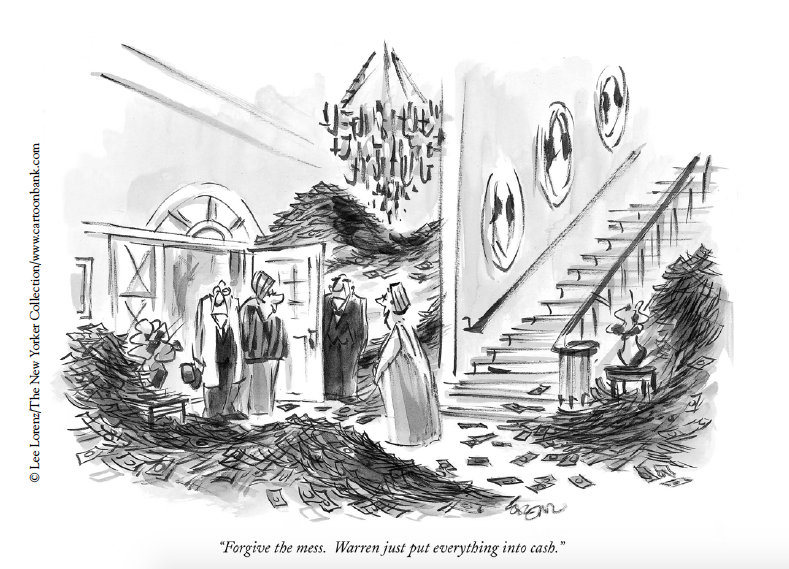Lessons in Financial Strength
“A financially strong investor is a superior investor.” This observation, distilled from my 25 years in the field of wealth management, is simple and yet so profoundly true, I decided to make it the motto of my company. All too many investors learned this truth the hard way during the recent financial crisis: You do not become financially strong by achieving superior results; you achieve superior results by becoming financially strong.
Early in life, my family drove home the importance of strength. My family didn’t buy the home we lived in, we built it. My brothers and I helped my father pound in the nails that held the frame of the house together, and you can bet we didn’t just walk away from boards or joists that still felt rickety. My father built nuclear power plants and oil refineries, structures that must be built to last and able to weather hurricanes and earthquakes. His duties gave him a “stronger is better” way of looking at life, which rubbed off on me.

Building my childhood home with my father
While the meaning of strength is obvious in structures, the concept of financial strength is often misunderstood. Many people equate it with simple, one-dimensional outcomes, like the value of a portfolio or the total wealth a person has accumulated. However, I have known people with $1 million who were financially strong (with their wealth structured in such a way that it can weather the harshest storms and tremors the marketplace can deliver), and people with $50 million who were not. Strength is really a matter of durability versus vulnerability.
Acquiring Strength
“It is not enough to do your best; you must know what to do, and then do your best.” -W. Edwards Deming
Financial strength resembles physical strength. You cannot accomplish a strong physique overnight. It takes persistent hard work to acquire and discipline to maintain. Some people spend hours in the gym with modest results, while others achieve great results in far less time with focused training. An insightful, experienced coach can work wonders as well. Likewise, financial strength takes time to acquire, but it is easier to maintain than it is to develop, and the right financial advisor can handle most of the heavy lifting on your behalf.

Robert’s Story

Quantity is not everything when it comes to financial strength.
When I first met him, Robert was one of the senior-most executives in a large, publicly traded company. From the start, I could see that he was smart and energetic, with a thoughtful, caring side that had made him admired in his company and his community. He was earning a great income and had accumulated a substantial nest egg. Despite these great advantages and assets that included several nice homes, Robert was not financially strong. He wouldn’t have expressed his problem in those words before we met, but he knew he had issues and needed better advice.
Robert realized that he was over-invested in his own company. The industry he was in had the volatility of a game of “Chutes and Ladders,” and if his company fell down a chute, he would take a huge personal hit. He lacked diversification, but also lacked the time and energy to focus on where his investments were and how they were performing. During the booming bull market of the 1980s and ’90s, he could all but ignore his portfolio and still achieve good results, but as the market hit rough patches he began to see contraction rather than growth. There were smaller problems as well: he was paying more than needed for transactions, he had incorrectly financed homes and an old estate plan, and he was not optimizing his stock options. In the rare free hours available to attend to his personal finances, he found his time consumed by low-value activities like processing piles of financial mail and paying bills. Instead of seeing and dealing with the big picture, he was slogging through endless necessary but secondary tasks and getting piecemeal financial advice from several sources. He recognized that he wasn’t managing his wealth anywhere near as well as he was managing his corporate duties.
He soon learned how much he could save every year by managing his portfolio more efficiently, and we showed him tools that could help him manage routine financial tasks in a fraction of the time they previously consumed. More importantly, he acquired the system, structure, support, and discipline that are crucial to achieving financial freedom. Gradually, over a period of years, Robert progressed from a patchwork approach to wealth management to a comprehensive approach- one that optimized his assets, estate, and portfolio while protecting his family’s lifestyle. In short, he moved from financial vulnerability to financial strength.
This strength was never more needed than in the fall of 2008, when the financial markets underwent their biggest crisis in decades. Many investors panicked, and many fortunes were greatly diminished or even lost. Robert and his family didn’t suffer from the crisis. They took advantage of it.
He knew he had the financial strength to weather the sharp global downturn because his portfolio and balance sheet had already acquired the sturdiness needed to pass a rigorous test. He knew that problems in one area, like tumbling stock and real estate prices, created opportunities in other areas, like estate planning and distressed real estate investing. While many investors compounded the crisis by making bad decisions, Robert made sound decisions. Thanks to clarity, confidence, and the long-term bargains a crisis creates, he came out of this challenging situation stronger than he went into it.
There’s a lot more to Robert’s story than his outstanding financial performance. Like nearly all the people who have worked with my company, Robert sees wealth as a means to an end, not an end in itself. The value of financial freedom is not measured in dollars. It is measured by the ability to devote yourself to the things that give your life meaning.
You cannot control the ups and downs of the market, but you can pursue financial strength that allows you to thrive in virtually any market. It is not something you can accomplish overnight; the time required depends on your starting point. Once you attain a position of strength, you can move from sporadic and inconsistent results to consistent and calculated results, and achieve real financial freedom.
Joseph J. Janiczek is the founder and CEO of Janiczek Wealth Management. This article is adapted from his book, Investing from a Position of Strength.


